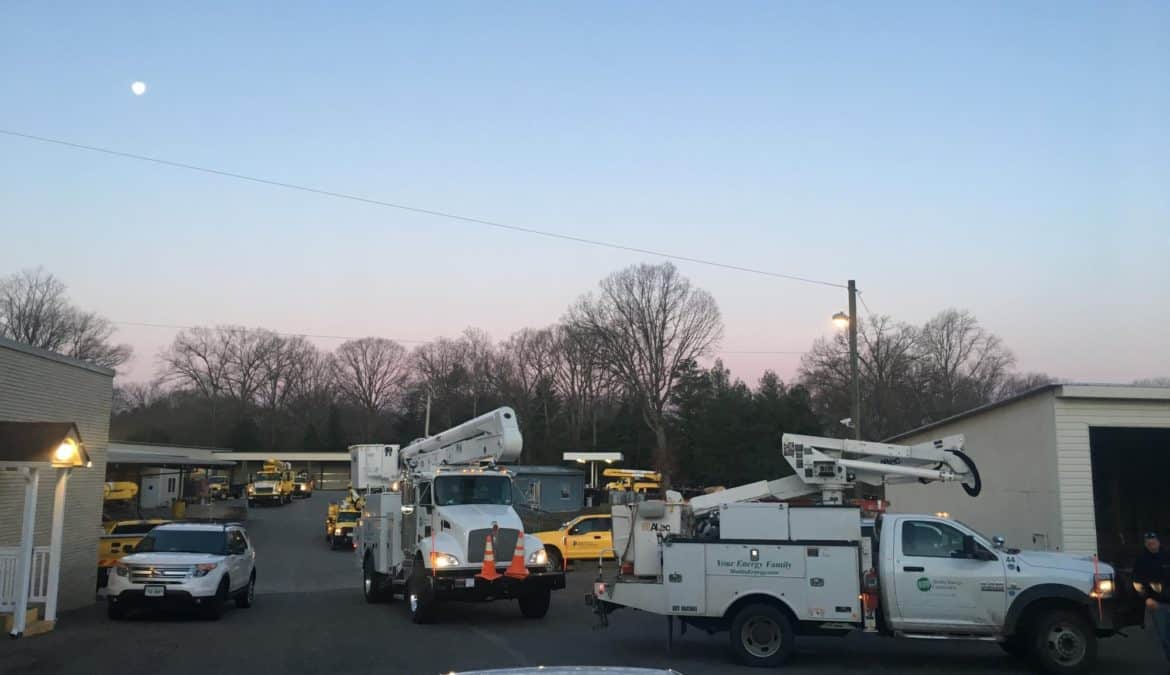Mike Mason’s day as a lineworkerfor Shelby Energy Cooperative actually started the night before. He was getting ready for bed when a woman reported her power out. It was Mason’s turn to be on call overnight for the Shelbyville-based utility. He drove to the woman’s house, identified a problem in the base of the meter, installed a temporary fix until an electrician could get out the next day and returned home two hours later. He reported to the co-op office at 7:30 the next morning.
“I like hunting down problems,” says Mason. “I know I’m doing something the members can’t do themselves. They depend on us.”
I meet Mason and his co-workers to write this story about a day in the life of a lineworker. I discover a group of people who carefully follow the rules of an elaborate system that lets the rest of us make magic by flipping a switch. It’s a system of little pieces of hardware, big trucks and a warehouse full of tools.
While every day is different, the same is true of the 713 lineworkers who work for Kentucky’s 26 electric co-ops providing power to more than 1.5 million co-op members.
Lineworkers are quick to credit other jobs at the utility—accountants who process their paychecks or the member services reps who talk to unhappy callers with power outages.
Still, we’re all fascinated by this unique profession involving high voltages and climbing poles in the snow and cold. That’s often what the lineworkers like best about the job.
“I like being outside and not at a desk all day. I get to meet a lot of different people,” Benji Bohannon says. “I like being at the top of a 40-foot pole and watching the sun come up over a beautiful countryside. A lot of people don’t get to see that.”
Today, Mason starts his day in a room with the rest of the lineworkers, each planning their day around stacks of paper—checklists, maps and work orders.
In addition to coordinating plans, these guys (there are a few women among the more than 15,000 co-op lineworkers around the country) need to keep track of a lot of equipment. They need to be wearing safety gear or have it close at hand—hard hat, safety glasses, fire-retardant uniforms, steel-toed shoes, regular work gloves, hot-line safety gloves.
Electric work is unforgiving
But before driving to their jobs, they turn their attention to the weekly safety meeting.
Safety coordinator Sarah Newton announces that while catastrophic contact with electric current is always a top concern, today’s meeting would focus on “slips, trips and falls that can cause very big issues.”
They then hear from Tony Dempsey, a member of the statewide safety team at the Kentucky Association of Electric Cooperatives.
“Working on electric lines isn’t dangerous,” says Dempsey, seeming to contradict every other safety message. But then he makes his point: “It’s unforgiving and it’s hazardous, but accidents don’t have to be a part of our work. We have the tools, we have the rules, the employees and the knowledge that can keep it from being dangerous.”
That safety emphasis seems to be working. From 2006 to 2015, co-op lineworkers across the country reported 53 injuries from falls, including falling off poles. In 2016, that number was zero.
By midmorning, the convoys are ready. I follow three lineworkers driving three trucks: a service truck, a bucket truck pulling a trailer with a large spool of wire, and a digger truck with a huge auger on top and pulling a trailer with a backhoe. They head across the county to relocate a ground-mounted transformer, moving it 500 feet uphill, near an underground connection at a new barn.
“It’s going to be muddy out there after the rain we’ve had,” says Rick Shaw, the crew leader who is a revered lineman among co-workers, with 41 years’ experience at Shelby Energy. “When you’re working on underground connections, mud is not your friend.”
Safety takes time
At the driveway into the worksite the crew faces the first of several time-consuming obstacles: managing a right turn without ripping out the mailbox. They drive to where they can turn around, allowing a left turn onto the property.
The trucks ease up the crushed-rock driveway, avoiding the soft ground on either side. Once there, the crew members change into rubber boots.
The men gather for a routine job briefing. They open a metal-clad clipboard, reading through a stack of forms, noting the address, cross street and account number—should they have to report an accident, location info would be quickly available. All three sign the form.
They break their huddle and de-energize the lines they will be working on, and let the office know the power has been cut. For the next two hours, they use the backhoe to dig out the transformer and carry it up the hill for rewiring into its new location. When they finish, they pack up and top off the gas tanks on the way back to the office, where they check paperwork and equipment for the next day’s jobs.
Everything the lineworkers did that day seemed to take a long time.
When asked about it later, Jason Ginn, Shelby’s manager of Operations, says “We don’t think this is taking a long time. We just think, this is how you do it. We don’t say, ‘hurry up.’ We look out for each other.”
From the June 2018 issue of Kentucky Living
















